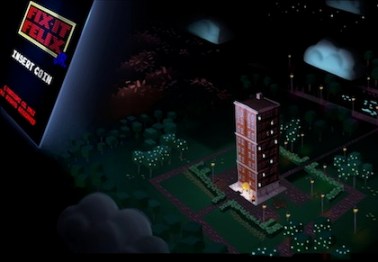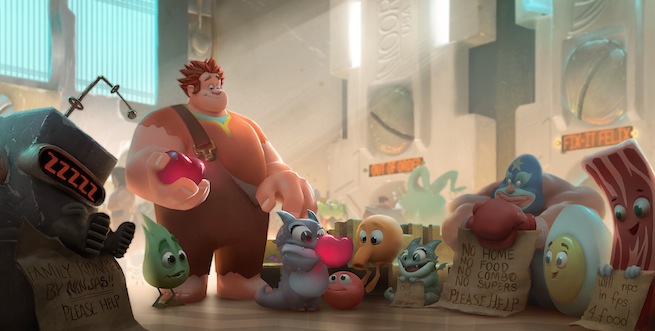GamesBeat: What was the idea behind the film’s aggressive marketing to make Fix-It Felix Jr. look like a real game from the ’80s with real arcade cabinets and a Flash-based online game?
Spencer: [Rich said] we need to create an actual Fix-It Felix Jr. game. And then we need to figure out how do we get it out there and have people think that game was actually real in 1982. So we brought in a developer who made 8-bit games in the 1980s. They brought in the old motherboards from the ’80s to try to make it exactly authentic as opposed to using today’s technology.
And we’re lucky we work for a Walt Disney company. We have people at the theme parks who know how to take things and age it. Each cabinet — I think there are 75 they’ve made so far — each one is different in terms of where the aging happens and what they chose to do.
Once that idea was there, we thought, “Why don’t we try to create other things to add to the authenticity?” They released an online commercial for Litwack’s Arcade (embedded below). They have a Fix-It Felix Jr. one, the Sugar Rush one is out there now, and I think the Hero’s Duty one is coming soon. And all three add up in terms of … how commercial technology might have evolved from 1980 to 1990 to today.
And all of it is about trying to create a history where these games could have been part of the actual gaming world.
[youtube http://youtu.be/wF_LJfwFsE4][Editor’s note: At this point, Clark Spencer had to leave. Screenwriter Phil Johnston came in to continue the conversation.]
GamesBeat: Did you face any challenges trying to integrate video games into the core storyline that was already there?
Phil Johnston: Not really. We knew it was going to be a video game movie. We just wanted the characters to be three-dimensional: have real human needs and flaws and stuff like that.
But before we got too heavy into how could it work … . Well, first, we had no idea how they got from game to game. We had this harebrained idea where [the characters] were going to travel through a vortex in the toilet — literally, that was the idea that for a few days stuck [Laughs]. And we were like yeah, that makes sense!
GamesBeat: Throughout the movie, Ralph tries to make himself a hero. So why didn’t he get a hero’s ending?
Johnston: There was never going to be a moment where he was “the hero.” And the fact is, the world he’s saving is a mess he has created.
[Director Rich Moore joins us.]
The more important journey is the relationship he forges with another human being he cares about more than himself, which is a much more personal moment of heroism I would say. For his arc, we always thought of it as [going from] selfish to selfless. However many iterations the story took, that was always the goal.
Rich Moore: You have to kind of try things to get the gold, I think. The conceit of how they travel from game to game [through the toilet] — we were convinced that was it. Like we had cracked it. If there was one thing that was gonna stay in this movie, dammit, it’s the fact that … .
 Johnston: Felix chases a nail through a toilet, and it’s a portal! [Laughs]
Johnston: Felix chases a nail through a toilet, and it’s a portal! [Laughs]
Moore: [Laughs] It had nothing to do with video games. But that’s the process: trying stuff and letting it have its day in court. We’ll realize, “That’s bad. What were we thinking?” But you just have to kind of be brave enough to put it out there and sit with it for a while and not be ashamed.
Johnston: Ralph had a horn! Ralph discovered that he had a horn when he got a haircut. It was so weird, the nonsense [that we came up with].
Moore: But it helps us get to the end.
GamesBeat: One of the pleasant surprises of the film was Ralph’s side-kick Vanellope and the way comedian Sarah Silverman portrayed her.
Moore: Right? What really put me over the top for Sarah was her autobiography, The Bedwetter. I loved her view of childhood and what that was like growing up. I really wanted to tap into that — of her whole take of what it was to be young. She was sweet and naïve but would say these inappropriate things at family functions. That’s really the crux of Vanellope.
Johnston: Boy was she dedicated. The thing that surprised me the most about her was the places she allowed herself to go emotionally in those heavier scenes.
Moore: When the whole thing came about the idea of Vanellope being the princess at the end — I remember pitching that idea to her. She was like, “No, no, no! ” But [when we showed how] Vanellope kind of rejects that, she [was relieved].
Johnston: And I think the cool thing about it is that the movie totally honors the emotions that Disney movies have always had. But it also says there is this other version of things where you don’t have to be a princess.
